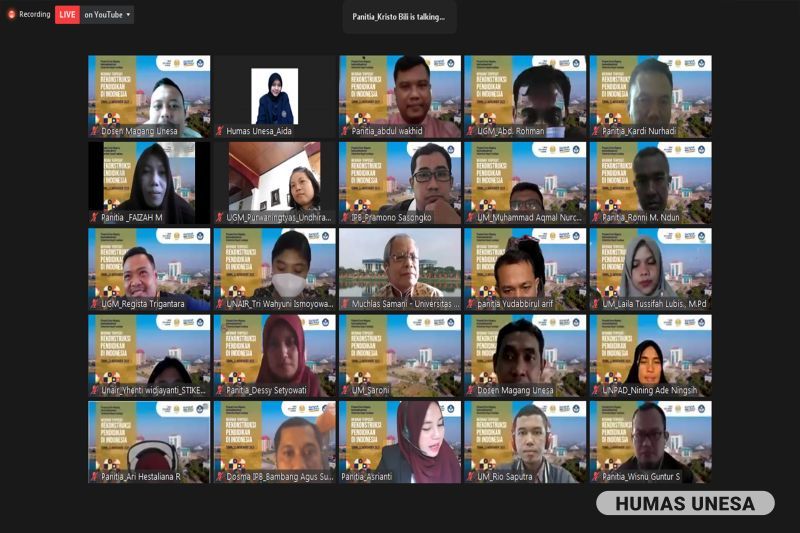
www.unesa.ac.id
Unesa.ac.id, SURABAYA-The Institute for Learning & Professional Development (LP3), State University of Surabaya, and the Management of the Internship Lecturer Program of the Ministry of Education and Culture held a centralized webinar with the theme 'Education Reconstruction in Indonesia' on Monday (22/11/2021).
Vice Chancellor for Academic Affairs, Prof. Dr. Bambang Yulianto, M.Pd. gave a speech and opened this webinar. He explained, as UNESA applies the concept of an independent campus, independent learning is implemented in the form of giving students the right to study for 3 semesters outside their study program, 1 semester is given the right to study outside the study program, but still on campus or at UNESA.
Then 2 more semesters were given the right to study outside the UNESA campus. For 2 semesters outside UNESA, this is mandatory, while for 1 semester outside the study program, you are given the right to choose, so you can remain in the study program or choose outside the study program.
He continued, studying off campus has many experiences, including 1) internships or work practices, 2) projects in villages, 3) teaching in schools, 4) student exchanges, 5) research or research, 6) entrepreneurial activities, 7) independent studies or projects, 8) humanitarian projects.
To regulate these matters, UNESA has an Independent Learning Organization Unit for the Independent Campus in which there are 3 divisions; KKN Division, Student Exchange and Research Internship Division, and Field Practice Division.
UNESA Chancellor for the 2010–2014 period, Prof. Dr. Muchlas Samani, M.Pd. who now serves as the General Chairperson of LAMDIK delivered material on reconstructing education with a necessity. He conveyed that the pattern of education is based on theory or science and not just trial and error, because education is irreversible.
People in work are divided into 4 levels, 1) Political commitment level, people who work on the basis of rules, 2) Intellectual commitment level, does it really fit in my place, if it doesn't fit, it will be modified, 3) Social commitment level, what do I teach? useful for students, 4) Level of spiritual commitment, whether what I teach is compatible with prevailing spiritual values.
So that education is seen as the outcome, as follows 1) Outcome, what abilities are needed in life in the next 20 years, 2) Output, CPL (Learning Achievements when Graduating) must be suitable as provisions in the next 20 years, 3) Process, learning must can form the desired CPL, 4) Input, what to learn and how to learn it. So it is not based on the subject, but the outcome.
For that, life characteristics need to be defined, then life skills as CPL and learning experiences are needed. "Basically, students need to be successful in life, not subjects, so the scientific ego needs to be lowered," he said. {UNESA PR]
Reporter: Aida
Editor: @zam*
Share It On:






